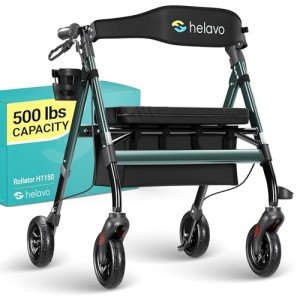
Adjustable Height Walker
Add a review FollowOverview
-
Founded Date December 1, 1961
-
Sectors Mechanical Foreman
-
Posted Jobs 0
-
Viewed 3
Company Description
Let’s Get It Out Of The Way! 15 Things About Reliable Walker We’re Tired Of Hearing

The Reliable Walker: Choosing the Right Mobility Aid for Your Needs
In an ever-evolving world where mobility challenges can develop for different reasons, a reliable walker can significantly improve an individual’s quality of life. Individuals looking for self-reliance in their motion find that a walker, frequently described as a walking aid, plays a vital function in their day-to-day activities, whether they are recuperating from surgical treatment, dealing with chronic discomfort, or experiencing age-related mobility issues.

In this post, we will discuss the significance of a reliable walker, the different types available, how to pick the Best Rollator Walker one for your requirements, and some frequently asked questions.
Comprehending Walkers
Walkers are mobility devices that aid people with walking troubles. They provide stability and support, helping to avoid falls and improving confidence when getting around.
Types of Walkers
There are several types of walkers available, and understanding the distinctions can assist you make an educated choice. Below is a table summing up the primary types of walkers.
| Type of Walker | Description | Advantages | Disadvantages |
|---|---|---|---|
| Standard Walker | A fundamental Secure 4-Wheel Walker without wheels, needing users to lift it to move. | Provides optimum stability; easy design. | Can be troublesome; less maneuverable. |
| Two-Wheeled Walker | Geared up with two wheels at the front for easier motion. | Easier to move; more lightweight. | Less stable than a standard walker. |
| Four-Wheeled Walker | A wheeled walker with four wheels, typically with a seat and hand brakes. | Extremely maneuverable; suitable for outdoor use; stability with seating. | Needs some upper body strength to run the brakes. |
| Rollator | A four-wheeled Medical-Grade Walker with a seat and storage area. | Perfect for longer ranges; comfortable seating option. | Less stability than basic walkers; can be more expensive. |
| Hemi Walker | Created for those who can utilize only one hand or lower limb. | Useful for one-handed support; lightweight. | Might not supply as much support as standard choices. |
Secret Factors to Consider When Choosing a Walker
Picking the ideal walker is essential for safety and self-reliance. Here are some key factors to consider:
1. User’s Physical Condition
- Examine the user’s balance, strength, and series of motion. Some users might need more support and stability, while others may prefer something lighter and more mobile.
2. Meant Use
- Think about where the walker will mostly be used– indoors, outdoors, or both. Walkers created for outdoor usage typically include bigger wheels.
3. Weight Capacity
- Guarantee that the walker can support the user’s weight. Most walkers feature weight capacity specifications, typically ranging from 250 to 500 pounds.
4. Adjustability
- Search for a walker that can be changed in height to guarantee appropriate posture and convenience while walking.
5. Additional Features
- Lots of walkers included features such as brakes, seats, baskets, and even built-in lights. Evaluate which features are required for the user’s requirements.
6. Visual appeals
- While functionality is crucial, lots of modern walkers are designed with looks in mind. Select one that the user feels great about using.
The Benefits of a Reliable Walker
Using a reliable walker has a number of benefits, consisting of:
- Increased Independence: Users can walk around by themselves without relying greatly on others for support.
- Enhanced Confidence: A stable walker offers users the security they require to move freely, reducing the worry of falling.
- Enhanced Stability: Walkers considerably enhance balance, particularly for those with mobility disabilities.
- Boosted Quality of Life: With improved mobility, users can engage more actively in social, leisure, and everyday activities.
Often Asked Questions (FAQ)
1. How do I understand if I need a walker?
If you find walking to be challenging, experience frequent falls, have actually just recently had surgery, or have chronic conditions affecting your mobility, it might be time to think about a walker.
2. Can I use a walker on outdoor surface areas?
Yes, however think about getting a four-wheeled walker or a rollator created particularly for outdoor terrains, as they typically have bigger wheels for much better maneuverability.
3. How can I change my walker for the best fit?
A lot of walkers have height-adjustable legs. Stand in your shoes, and with your arms relaxed at your sides, the top of the walker need to be at wrist level.
4. How do I keep my walker?
Frequently check the walker for any loose screws or parts, guarantee the wheels are moving efficiently, and tidy it periodically to preserve its condition.
5. How can I build my confidence while utilizing a walker?
Start using the walker in familiar and Safe Walker environments. Slowly increase the complexity of your environments as you end up being more comfortable.
In conclusion, a reliable walker is not simply a mobility aid; it’s a means to higher independence, safety, and improved quality of life. Understanding the kinds of walkers readily available and examining individual needs can help people make informed choices. Whether it’s a standard walker or a modern Sleek Rollator Design, the right equipment cultivates self-reliance and confidence in mobility.
If you or a liked one deals with mobility challenges, think about buying a walker that fulfills personal needs, improves mobility, and ultimately, improves day-to-day living. With the best choice, users can reclaim control of their motion, promoting a more active and fulfilling life.